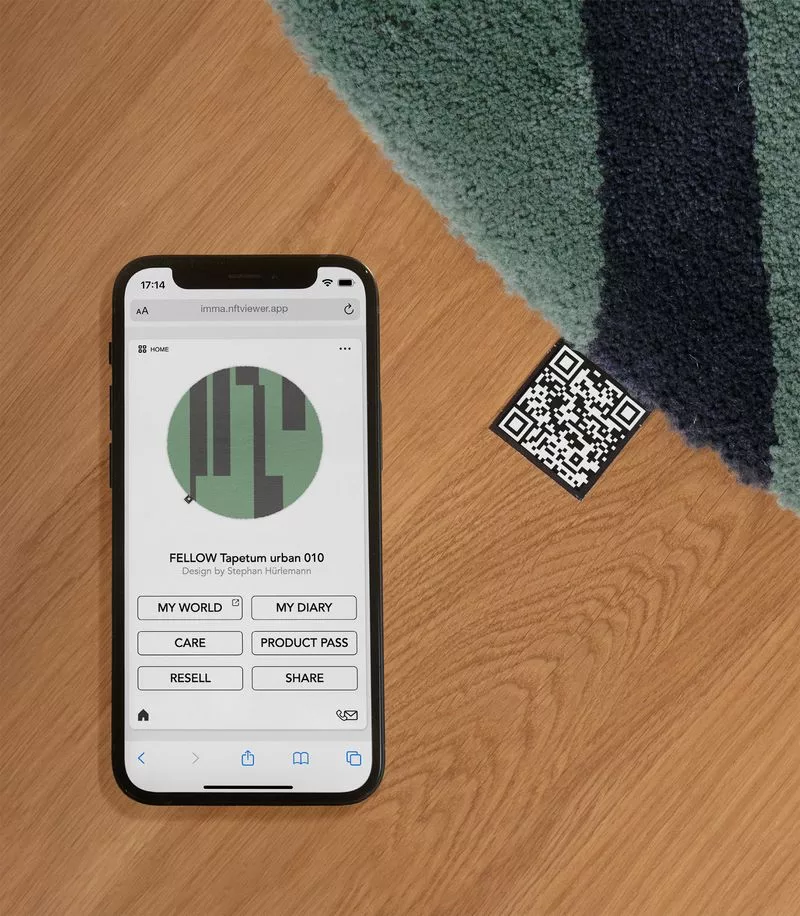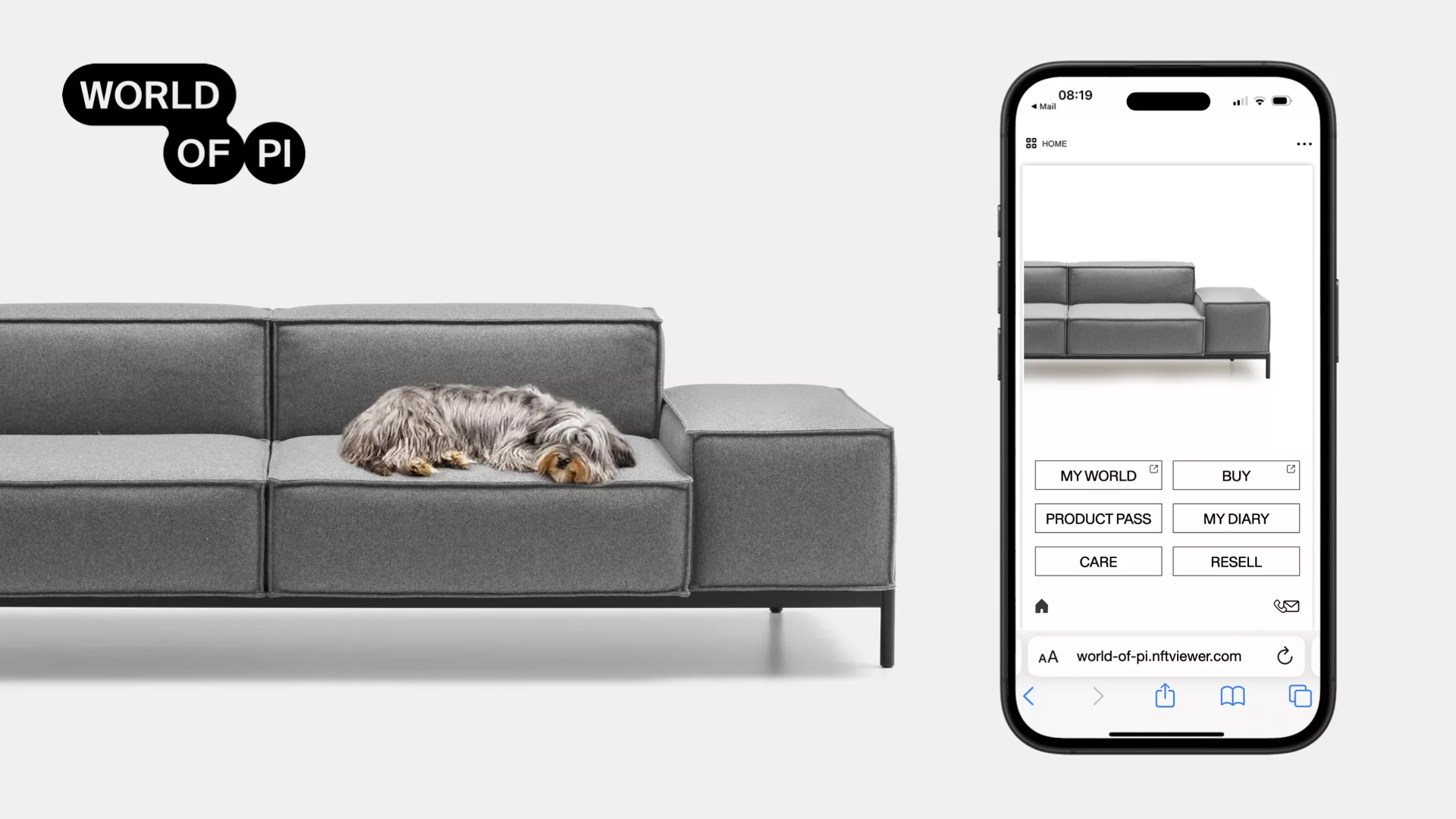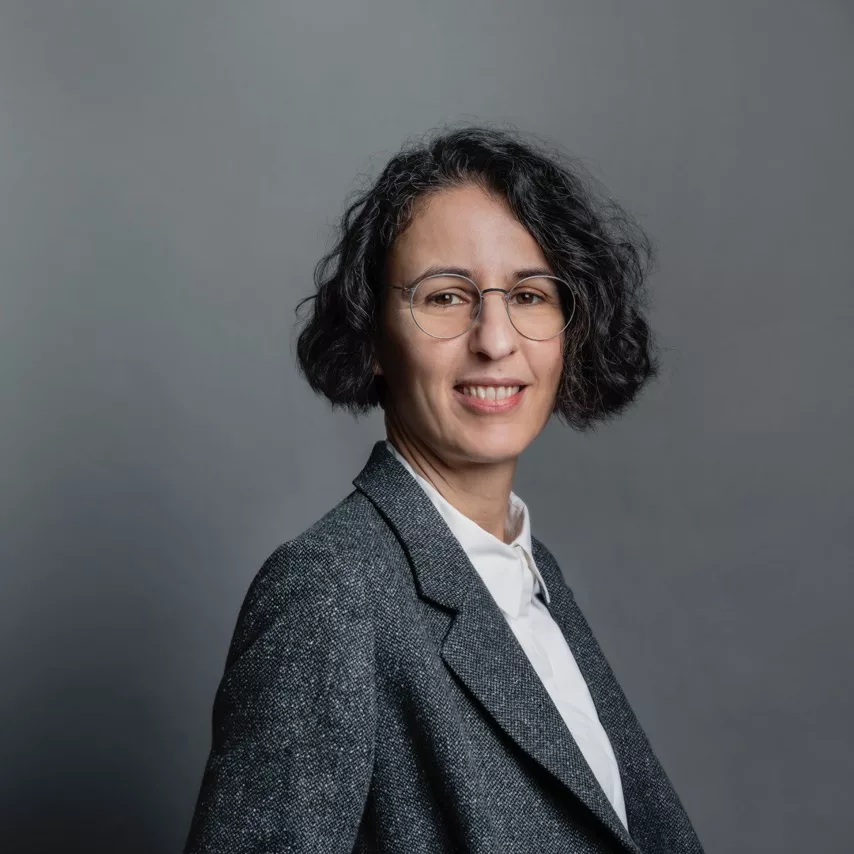Swiss company World of Pi offers digital, Web3-based services for doing business in cycles – tailored to the furniture and design industry. Stephan Hürlemann, designer and co-founder, explains what it takes to move to a circular economy.
by Jasmin Jouhar

What Is the Average Life Cycle of a Sofa? Furniture is manufactured, used, discarded and in most cases incinerated. This means that the resources used to make the furniture are wasted. ‘This is the old, linear way of thinking’, says Stephan Hürlemann. The future average lifecycle of a sofa will start with the product being given a unique digital identity at the factory – tamper-proof thanks to blockchain technology, according to the Swiss designer and architect. This identity will remain with the sofa for the entire life cycle of the product.
Once registered, the sofa is delivered and used as usual. If it becomes soiled or damaged, the digital identity provides access to care, maintenance and repair information. When it is no longer needed, it can be returned to the manufacturer, who can identify it, reupholster it if necessary and resell it. Alternatively, the owner can sell it on to another user. The digital identity allows the buyer to verify its authenticity. Either way, the resources embedded in the sofa are preserved, closing the loop for the first time. ‘We have to think of products as raw materials’, says Hürlemann. Together with partners, he has founded World of Pi, which offers Web3-based services for the design and furniture industry. The company aims to drive the industry’s transition to a circular economy. Initial customers include Zumtobel, Ruckstuhl and Puma.
‘We need to decouple value creation from resource consumption.’
– Stephan Hürlemann, Designer and co-founder of World of Pi
More Than Just a Digital Product Passport
World of Pi’s blockchain-based identity certificate, named after the mathematical constant ‘Pi’, meets the requirements of the Digital Product Passport (DPP) as part of the EU’s ESPR. This means that through the unique ‘Pi’, all information about the origin, material composition and environmental impact can be accessed via a chip or QR code on the product. However, the DPP is only one component of the ‘World of Pi’ concept, which Hürlemann founded together with Barbara Hutter, Stephan Bachmann and Lukas Fluri. ‘We need a system that allows manufacturers to stay connected to their products and work with them’, says Hürlemann.
This conviction stems from the belief that circular business models should challenge traditional production-based approaches. ‘We need to decouple value creation from resource consumption’, he adds: ‘We need to get more value out of existing products’. As a result, ‘World of Pi’ offers additional software solutions, such as resale platforms. These allow manufacturers to resell their used products through their own websites and generate additional revenue. Hürlemann sees great potential in the second-hand furniture market: ‘It’s growing fast and we’re watching it closely.’

Circular Economy as a Business Sector
In recent years, a whole business sector has developed around digital services for the circular economy, driven in part by EU sustainability regulations. In addition to ‘World of Pi’, other start-ups offer similar services. Münster-based Narravero, for example, develops digital product passport solutions and works with design companies such as Designfunktion and Keuco. The Dutch company Circularise specialises in product tracking with the aim of creating transparent, circular supply chains, with clients in the automotive, electronics and chemical industries. In the luxury sector, groups such as LVMH, OTB, Prada Group and Richemont have formed the Aura Blockchain Consortium. ‘We aim to improve the experience of buying, owning, selling, reselling and recycling luxury goods’, their website states. Meanwhile, in the construction sector, Madaster has established itself as a platform that consolidates building data, creates material passports and helps assess carbon footprints and recycling potential.
The technology for such applications has been around for some time, says Hürlemann. The key, he says, is to make these applications accessible and understandable.


‘The prevailing design business model is inappropriate because it generates income only through the sale of new products and creates the wrong incentives.’
– Stephan Hürlemann, Designer and co-founder of World of Pi
A Challenge for Designers
A circular economy will not only challenge the current business models of manufacturers, but also those of designers, says Hürlemann. Designers will have to rethink how they make a living in the future. Currently, both designers and manufacturers are incentivised to sell as much as possible, with designers typically generating income through royalties. ‘The prevailing design business model is inappropriate because it generates income only through the sale of new products and creates the wrong incentives’, says Hürlemann. Hürlemann himself has become increasingly uncomfortable with this traditional approach. Especially when it comes to the development of new commissions: ‘A new product should only be developed if there is a compelling reason to do so – the mere possibility doesn’t justify it’.
For Hürlemann, World of Pi is an opportunity to use his skills as a designer without having to create new products. He remains optimistic about the furniture industry: In the last ‘three to four years, the approach has changed dramatically. Where sustainability used to play a minor role in product development, now everything is under the microscope – weight, materials, recyclability. Many companies are open to these changes and show interest when presented with World of Pi’s services. We often start discussions at C-suite level very quickly’, says Hürlemann. But the road to circular business models is long and takes time. ‘The transformation has to start now. The companies we’re talking to understand that’.

Share on Social Media

About the Author
Jasmin Jouhar is a freelance journalist based in Berlin, Germany. Her areas of expertise include design and brands, architecture and interior design. She writes for various German-language trade and general media, including the Frankfurter Allgemeine Zeitung, the online platform Baunetz and the magazines Schöner Wohnen and AD. She also presents industry events and is responsible for corporate publishing projects. Jasmin Jouhar is committed to promoting young design through coaching, workshops and lectures.
Also on ndion
-

ESPR (Part 1/3): The New Standard for Sustainability
6 Min Lesezeit The EU’s Ecodesign for Sustainable Products Regulation (ESPR) builds on the existing Ecodesign Directive and aims to…
-

ESPR (Part 2/3): ‘We’re just getting started’
2 Min Lesezeit The new Ecodesign for Sustainable Products Regulation (ESPR) is a challenge for designers and companies: in particular,…
-

ESPR (Part 3/3): Start Looking At the Supply Chains Now
5 Min Lesezeit The EU’s new Ecodesign for Sustainable Products Regulation sets ambitious goals and poses major challenges, especially for…

